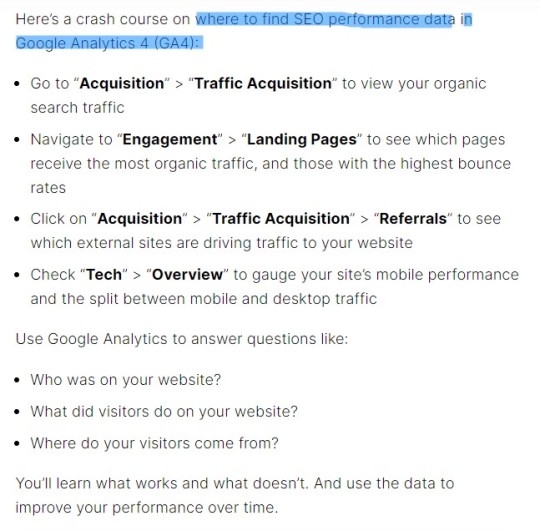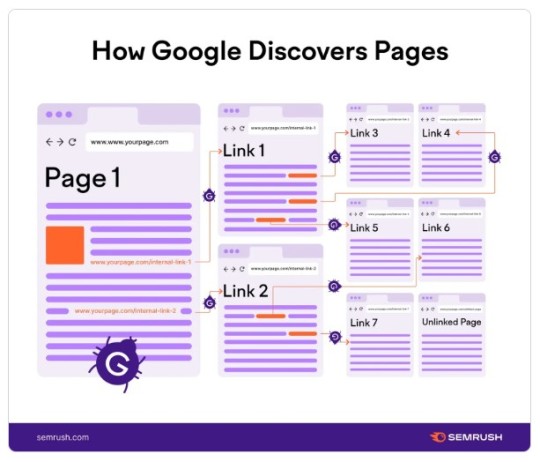#Organic Search
Text
SEO Dominance: The Key to Online Success
1. Introduction
In today’s digital age, having a strong online presence is crucial for businesses of all sizes. The internet has become a vast marketplace, and businesses need to ensure that they are easily discoverable by their target audience. Search Engine Optimization, or SEO, plays a pivotal role in achieving this goal. In this comprehensive article, we will delve deep into the world of…

View On WordPress
#Backlinking#Content Marketing#Digital Marketing#Google Ranking#Keyword Optimization#Link Building#Mobile SEO#Off-Page SEO#On-Page SEO#Online Marketing#Organic Search#Search Engine Optimization#SEO Analytics#SEO Best Practices#SEO Ranking#SEO Strategies#SEO Techniques#SEO Tips#SEO Tools#SEO Trends#SERP (Search Engine Results Page)#User Experience (UX)#Voice Search Optimization.#Website Optimization#Website Traffic
6 notes
·
View notes
Text
The Importance of SEO in Today's Digital Landscape
First and foremost, search engines continue to be the primary source of online traffic for most websites. When people are looking for information, products, or services, they turn to search engines like Google, Bing, and Yahoo. These search engines use complex algorithms to determine the most relevant and high-quality websites to display in their search results. Without SEO, your website may not…

View On WordPress
0 notes
Text
Difference between Organic Search vs Paid Search
Organic Search v/s Paid Search is a comprehensive product that provides a detailed comparison between these two essential marketing strategies. It offers valuable insights into the benefits and drawbacks of each approach, helping businesses make informed decisions about their online advertising efforts. With a focus on organic search engine optimization (SEO) and paid search advertising.
#Organic Search#Paid Search#Search Engine Marketing#SEO#PPC#Digital Marketing#Search Advertising#Search Results#Organic Traffic#Paid Traffic#Levycon India#Online Marketing#Search Engine Optimization#Google Ads#Keyword Ranking#Search Rankings#Cost Per Click#Click Through Rate#Search Campaigns#Search Engine Visibility#Search Strategy#Web Traffic
0 notes
Text
How to improve SEO with Google Analytics?
Improving SEO with Google Analytics can be a game-changer for your website's visibility and organic traffic.
With the right insights and data, you can make informed decisions to optimize your website and rank higher in search engine results.
Let's get into key steps you can take to leverage Google Analytics for SEO success.
Do you know? - “GA4 underreports actual traffic, for privacy and technical reasons. Your real traffic and conversions are likely 20% greater or more” – Orbit Media Studios
Improve SEO with Google Analytics:
1. Set up Google Analytics:
Before you can start using Google Analytics to improve your SEO, make sure it's set up correctly on your website.
Install the tracking code on all pages, set up goals, and enable site search tracking if applicable.
2. Monitor Organic Traffic:
Google Analytics provides valuable data about your website's organic traffic.
Keep an eye on metrics like new users, CTRs, bounce rate, engagement rate, average session duration, and more to gauge the performance of your SEO efforts.
Identify any sudden drops or spikes in organic traffic and investigate the potential causes. Enhance what worked.
3. Analyze Keyword Performance:
The "Queries" section under the 'Search Console' item in Google Analytics shows you the keywords people use to find your website through organic search.
This data helps you understand which keywords are driving the most traffic and which ones aren't.
Optimize and scale your content around high-performing keywords and consider improving pages with poor performance or having high bounce rates.
Ensure you integrate the Google Search Console for a concise overview, although its full capabilities are best understood and analyzed directly on its platform.
4. Track Landing Pages:
The "Landing Pages" section under the 'Reports' and 'Engagement' item report reveals which pages on your website are attracting the most organic traffic and engagement.
Here you can uncover data about sessions, users, new users, average engagement time per session, and conversions.
Analyze the performance of these pages, identify any patterns or trends, and optimize them further to increase their visibility in search results.
Also, use this information to refine your content strategy and create more engaging landing pages, blog posts, or articles.
5. Identify Top-Performing Content:
The 'Reports' item in Google Analytics provides detailed insights into how visitors engage with your website's content. Have a look at various sections within to get a larger view.
Identify pages with high engagement. These pages indicate what type of content resonates well with your audience and can guide your future content creation efforts.
'User attributes' section can help tailor marketing strategies to better target and engage relevant geographical audiences.
Do you know? - “If your website has a search tool, you have a listening tool. You can use GA4 to see what people are searching for. This is useful for content strategy, but it can also show you clues into content gaps …because you can see what people are searching for but not finding” – Orbit Media Studios
6. Monitor Bounce Rate:
Website speed is crucial for both user experience (UX) and SEO. Identify areas where your website might be lagging.
In fact, slow-loading pages can lead to higher bounce rates and lower rankings in search results. Remember, page speed is one of the ranking signals.
Optimize your website's performance by compressing images, enabling browser caching, reliable hosting, and minimizing server response time.
The 'Tech' section provides data on users by device category (mobile, desktop, and tablet), users' browser information (like Chrome, Edge, Safari, Android, and others), and screen resolution aspects.
This helps to identify any technical issues, optimize for different devices, and improve overall website performance for better search engine rankings.
7. Track Conversions:
While SEO focuses on driving organic traffic, conversions are the ultimate goal for most websites.
Set up conversion goals in Google Analytics to track how well your website is converting visitors into leads or customers.
Analyze the sources of converting traffic and optimize your SEO efforts accordingly.
8. Utilize Google Search Console Integration:
As mentioned earlier, GSC is another powerful tool that complements Google Analytics for SEO purposes.
Linking both accounts provides a bit deeper insight into your website's search performance, including click-through rates (CTR), impressions, clicks, engagement rate, average position in search results, conversions, and more.
By leveraging the wealth of data available in Google Analytics, you can fine-tune your SEO strategy, identify areas for improvement, and ultimately boost your website's visibility in search engine rankings.
SEO Performance Data in Google Analytics 4 (GA4):

Image Content Source - Semrush
Remember that SEO is an ongoing process, so regularly monitor your analytics data to stay ahead of the competition and adapt to changing search trends.
In fact, you're aware that changes are occurring in the SEO landscape as a result of the development of Search Generative Experience (SGE) or AI-driven search.
“As SGE becomes more integrated within the SERPs, users will likely spend more time on Google than on individual consumer websites. This change will significantly impact how we measure organic SEO success” – Moz
In conclusion, leveraging Google Analytics can significantly enhance your SEO efforts by providing valuable insights into user behavior, content performance, technical aspects, and more.
By utilizing its data, you can surely make informed decisions to optimize your website, drive targeted traffic, and ultimately improve your search engine rankings.
Here's related information that you may also find helpful – What is Social Media Integration in Website? [Uncover the necessity]
#seo#digital marketing#google analytics#organic search#seo and online marketing#high quality content
0 notes
Text
SEO and content optimization are inseparable. Together, they amplify brand visibility, organic reach, and global impact……
#contentstrategies #onlinecontentcreation #organicreach #businessgrowth #Downbadtube
#seo services#seo#search engine optimization#digital marketing#online marketing#marketing agency#quality#popularblog#weeklyblogs#blogs#tumblog#girl blogger#blog#blogger#blogging#education#stylish#learning#networking#pinterest#girlblogging#girlblogger#business#growth#business growth#organic search#downbadtube
0 notes
Text
What Are the Natural Search Engine Optimization Strategies for Business Growth?
For the best results on the SEO front, it is important to use organic search engine optimization and paid strategies in a balanced way. An SEO agency like SEO Resellers Canada helps you choose the best strategies for your company. Read more: https://seoresellerscanada12.blogspot.com/2024/03/what-are-natural-search-engine.html
0 notes
Text
Job Searching Tips Those Of You That Work On Television
If come across you're sending resume after resume alongside phone still isn't ringing it's missing a competitive advantage. What your resume needs can be always to clearly show the hiring manager who you are, why you're probably the most effective at utilising do and in what way you're gonna be meet their needs. You have to peak the hiring manager's interest enough to see the call and below are some reasons why your resume isn't quite making the cut.
Actionable tip: Don't use the header at all, and only put "continued." in the footer with the first page. That way nothing critical is didn't detect. To free up more room on the page set your margins to three.7" on all sides Resume Optimization and employ a sans-serif font, like Arial, in 10-point or 11-point.
For SEO purposes, you'll want to change site post's title slightly because it comes on in position in Job Search Optimization results. Make sure at least one keyword is obtained in the meta title, but make sure it continues to be attention-grabbing. This may be a finer point, and if ever the post's title is already well-optimized you might not have to alter the meta title just about all.

youtube
Customize your resume must. You don't have to go crazy customizing it, but when there is a word or phrase that keeps popping up in their employment posting, include it with your insurance coverage.
Avoid getting your category links too large. Search Engines don't like crawling into levels ATS Friendly Resume to find your listings and having subdirectories which can too deep will affect your recommendations ATS Friendly Checker . For me, the most you should have is 5 directory levels deep unless it is extremely necessary.
As I've said before, every page that does have a title upon it needs a relevant keyword. Inside of the title you want to use your keyword and then maybe three more times throughout the page. The determining factor on how many times you make use of the keyword is simply by how much content you on the page. Take care not to smother or cram the keyword over the reader's neck and throat. Make sure its natural and has a good flow. An insider tip from me, refrain trying your company name as keywords. I'm only saying this mindful about may be rather a few people that can't predict your company name, so they really will cease searching a person personally.
This could be the direction the web is moving today, with so-called "Web 2.0" websites such as YouTube and Facebook advertised everywhere where users can also add their own movie clips, images and also information. Of course, web-site does to not have to have these features to use a CMS, but a content management system allows marketing is going to to grow and expand easily for future wants and needs. It is important you are and master how may be the to use your website using some years from now and in case you require a CMS or. This type of design usually comes at a higher initial cost, but will make all changes and extra work stored on your web site a breeze later on.
There's an easy way to see whether a link is an honest quality web site link. For a particular search term, if a webpage is in top 200 or top 1,000 in the particular website (Google, Yahoo or MSN), the links from those pages are true quality links for that search algorithm. Yes, a quality link on-line may never be a quality link for Yahoo and MSN. Would not find many or any one those pages from high PR directory pages may charge you $20 to $40 and also more to the listing. Main reason is plain. The links individuals directory pages aren't relevant to the content of those same pages. Links from those pages are high PR, relevant to your page, but but, they are true quality links.
0 notes
Text
https://www.brightbraintech.com/blog/can-a-good-seo-agency-do-wonders-for-business/
#SEO agency#BrightBrain#Business improvement#Website performance#SERP rankings#Online visibility#SEO strategy#Digital marketing#Search engine optimization#Website optimization#Organic search#Keyword research#Web traffic#Conversion rate#Brand awareness
0 notes
Text
Organic Search Result
To significantly boost organic search results, focus on crafting high-quality, relevant content that resonates with your target audience's needs and interests while leveraging strategic keyword optimization and building authoritative backlinks from reputable sources. Additionally, prioritize mobile optimization, enhance website speed, and regularly update your site with fresh, engaging content to maintain search engine visibility and attract organic traffic organically. Consistently monitoring and analyzing performance metrics, adapting SEO strategies accordingly,
0 notes
Text
Best SEO Company in Pune, PimpriChinchwad | SEO Services in India | SEO expert in India
#Search Engine Optimization#SEO#SEO Services#SEO company#Best SEO Agency#SEO Strategy#SEO Techniques#Organic search#Organic SEO#Organic results#https://www.opstechsolution.com/best-seo-company-in-pune.html
0 notes
Text
We Provide Best SEO Services
We are constantly looking for better ways to do SEO , we take your results seriously and our team is dedicated to send more leads to your business.
We are SEO nerds so let us do the technical stuff so you can get back to doing what you do best!
0 notes
Text
Step up Your Authority With Outreach Neo’s
Is your website struggling to rank higher in search engines? Lacking authority backlinks is likely the culprit. Outreach Neo's Authority Link Service helps sites like yours skyrocket domain authority with an all-white hat link-building and blogger outreach program. Their link velocity technology and tiered linking from high-quality sites within your niche provide the ranking signals search engines want to see. Step up your site's authority and get the organic search visibility you deserve with Outreach Neo!

#SEO#search engine optimization#link building#outreach service#domain authority#DA#site authority#ranking signals#organic search#search visibility#backlinks#blogger outreach#guest posting#link equity#relevant links#niche edits#tiered links#high quality sites#white hat links#link velocity#Google rankings#website authority#Tumblr#digital marketing#online marketing#website promotion#site optimization#link metrics#link quality#link building service
0 notes
Text
Optimizing for Leads: The Power of SEO in Your Marketing Strategy
In today's digital age, having a strong online presence is paramount for businesses looking to succeed in the competitive market. Search Engine Optimization (SEO) plays a pivotal role in enhancing visibility and driving organic traffic to your website. This article explores the significance of optimizing for leads through effective SEO strategies.
Table of Contents
Introduction to SEO and its Importance
Understanding Leads and their Value in Marketing
The Connection between SEO and Lead Generation
Keyword Research: The Foundation of Lead-Oriented SEO
On-Page Optimization for Lead Conversion
Creating High-Quality Content that Converts
User Experience and its Impact on Lead Generation
Mobile Optimization: Catering to On-the-Go Leads
Local SEO: Targeting Geo-Specific Audiences
Link Building for Trust and Credibility
Social Signals: Amplifying Lead Generation
Analytics and Data-Driven Lead Optimization
Staying Updated with SEO Trends and Algorithm Changes
Optimizing Landing Pages for Maximum Conversions
Conclusion: Elevating Lead Generation with SEO
Introduction to SEO and its Importance
Search Engine Optimization is a multifaceted approach aimed at improving a website's visibility on search engine result pages (SERPs). It involves various techniques and strategies to ensure that a website ranks higher for relevant search queries.

Understanding Leads and their Value in Marketing
Leads are potential customers who have expressed interest in a product or service. They are the lifeblood of any business, representing opportunities for conversions and sales.
The Connection between SEO and Lead Generation
SEO serves as the bridge between potential customers and your website. By optimizing for relevant keywords and providing valuable content, you attract leads who are actively searching for what you offer.
Keyword Research: The Foundation of Lead-Oriented SEO
Keyword research involves identifying the terms and phrases potential customers use to search for products or services. It forms the cornerstone of lead-oriented SEO, enabling you to target the right audience.
On-Page Optimization for Lead Conversion
Optimizing on-page elements such as meta titles, descriptions, and headers ensures that your content aligns with search intent. This not only improves rankings but also enhances the likelihood of lead conversion.
Creating High-Quality Content that Converts
Content is king in the digital landscape. Producing informative, engaging, and relevant content establishes your authority in the industry and encourages leads to trust your brand.
User Experience and its Impact on Lead Generation
A seamless and user-friendly website experience is crucial for lead generation. Slow-loading pages, complex navigation, or a lack of mobile optimization can deter potential leads.
Mobile Optimization: Catering to On-the-Go Leads
With the prevalence of mobile devices, optimizing for mobile users is imperative. A mobile-friendly website ensures that you capture leads browsing on smartphones and tablets.
Local SEO: Targeting Geo-Specific Audiences
For businesses with physical locations, local SEO is indispensable. It helps potential customers in your vicinity find and engage with your business.
Link Building for Trust and Credibility
Quality backlinks from authoritative sources signal to search engines that your website is trustworthy. This, in turn, boosts your rankings and instills confidence in potential leads.
Social Signals: Amplifying Lead Generation
Social media signals are becoming increasingly influential in SEO. Active engagement on platforms like Facebook, Twitter, and LinkedIn can drive traffic and generate leads.
Analytics and Data-Driven Lead Optimization
Utilizing analytics tools provides valuable insights into the behavior of your website visitors. This data empowers you to refine your SEO strategies for better lead generation.
Staying Updated with SEO Trends and Algorithm Changes
The digital landscape is dynamic, with search engine algorithms constantly evolving. Staying informed about the latest trends and updates ensures your SEO efforts remain effective.
Optimizing Landing Pages for Maximum Conversions
Landing pages serve as entry points for potential leads. Optimizing them with compelling content and clear calls-to-action maximizes the chances of conversion.
Conclusion: Elevating Lead Generation with SEO
Incorporating effective SEO strategies into your marketing efforts is a game-changer for lead generation. By aligning your content with search intent and providing a seamless user experience, you can attract and convert high-quality leads.
#SEO Strategy#Search Engine Optimization#Marketing Techniques#Digital Marketing#Online Visibility#Website Optimization#SEO Impact#Content Marketing#Organic Search
1 note
·
View note
Text
How are Pages Indexed?
Pages are indexed by search engines using a process called crawling and indexing.
In fact, it involves a series of steps to ensure that they are appropriately added to the search engine's database and can be retrieved when relevant queries are made.
Let me break it down for you for an easy understanding of how pages are indexed.
Pages Indexing by Search Engines:
1. Crawling:
Search engine bots, also known as crawlers or spiders, start by visiting web pages across the internet.
They do this by following links from one page to another. This process is known as crawling.

2. Discovering Content:
When a bot arrives at a web page, it reads the page's content, including text, images, and other multimedia elements.
It analyzes the content and follows any internal links on the page to discover more content.
3. Parsing and Storing Data:
The bot then parses the content it discovers, extracting relevant information such as keywords, meta tags, and other HTML elements. This data is stored in the search engine's index.
4. Analyzing Links:
The bot also analyzes the links on the page to find other pages to crawl. This process helps in discovering new content and understanding the structure of the website.
5. Indexing:
After collecting and parsing the data, the search engine adds the page to its index, which is a large database containing information about all the web pages the bot has crawled.
The index includes key information about the page's content, keywords, and other relevant data.
6. Ranking:
Once a page is indexed, the search engine's algorithms analyze and evaluate the page's content to determine its relevance to specific search queries.
This process helps in ranking the page for relevant search queries.
7. Retrieval:
When a user enters a search query, the search engine retrieves relevant pages from its index and presents them to the user in the search results.

Remember that indexing is an ongoing process, and search engines continually update their indexes as they crawl the web.
So, even if your pages are initially indexed, they can be removed or reevaluated over time based on changes to content or other factors including those influenced by search engine updates.
It is also important to note that, not all pages submitted for indexing by search engines will actually be indexed.
There could be some on-page and technical SEO issues that may prevent them from indexing.
“In October 2023, Google confirmed that its switch to mobile-first indexing was finally complete. In other words, Google now crawls and indexes pages from the perspective of a mobile browser” – Semrush
To ensure your web pages get indexed effectively, here are a few best practices to follow:
1. Create High-Quality Content:
Search engines prioritize valuable, relevant, and unique content. Make sure your content is well-written, informative, and engaging. Write for your users, not for search engines.
2. Use proper HTML structure:
Organize your content using headings (H1, H2, H3), paragraphs, lists, and other HTML elements based on the content type.
This helps search engines understand the structure and hierarchy of your page.
3. Optimize Meta Tags:
Include relevant keywords in your page title tag (title element) and meta description. These elements appear in search results and can influence click-through rates (CTRs).
Also, make sure on-page SEO elements are fully addressed.
4. Build Links:
Linking to other pages within your website (internal linking) and acquiring backlinks from other reputable websites (link building) can help search engines discover and index your pages faster.
5. Submit a sitemap:
A sitemap is a file that lists all the pages on your website. By submitting it to search engines, you can ensure all your pages are indexed.
You can submit it through your Google Search Console (GSC) account.
6. Monitor Crawl Errors:
Regularly check your website's crawl errors report in Google Search Console or other webmaster tools to identify any issues that may prevent indexing, such as broken links or server errors.
Address them as soon as possible to get things on track. If you find it difficult, you may either hire an SEO expert or an SEO agency.
“By optimizing a website’s infrastructure and eliminating friction points that hinder crawling and indexing, technical SEO lays the groundwork for other efforts like content creation and link building to be successful” – Search Engine Land

In conclusion, understanding how pages are indexed is crucial for improving a website's visibility and accessibility to users.
By focusing on creating high-quality content, optimizing for search engines, and ensuring proper indexing, your business can enhance its online presence and reach a wider audience.
Here's related information that you may also find helpful – How does Google measure How Interesting your Content is?
1 note
·
View note